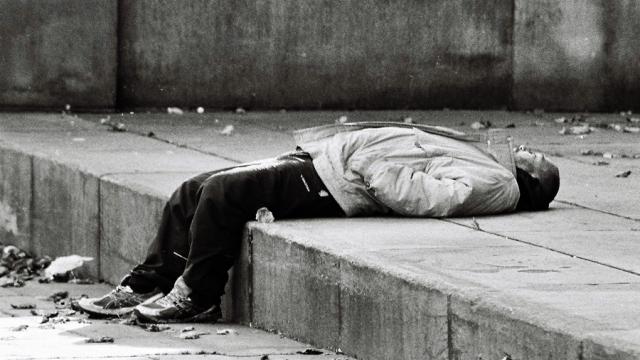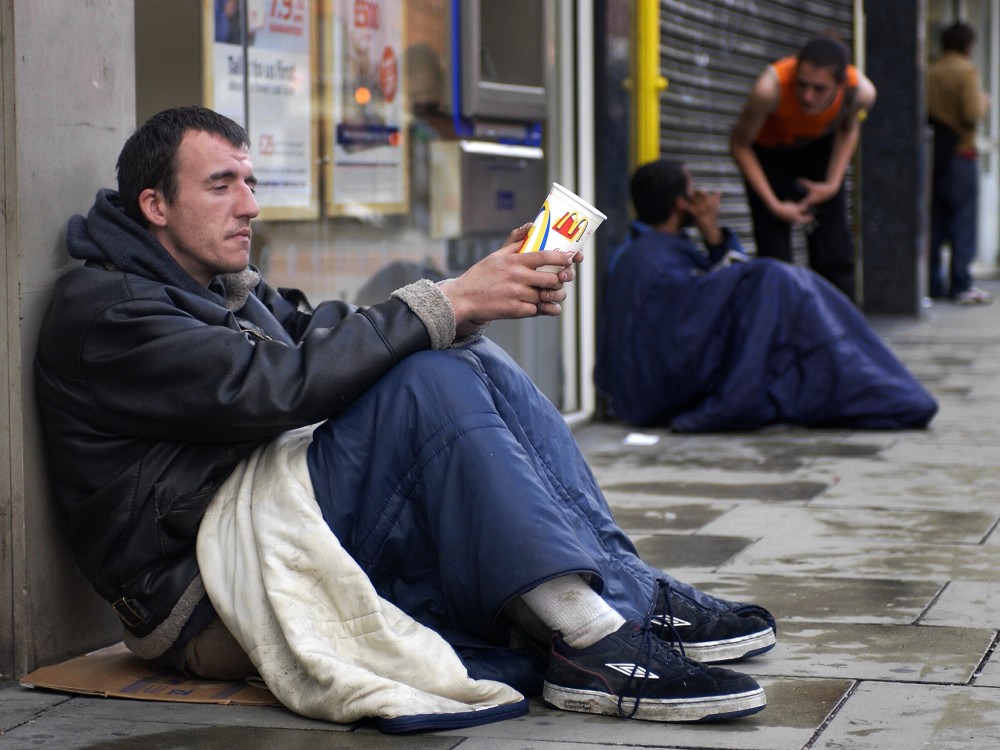
On April 15, Manchester Town Hall was in lockdown as anti-austerity protestors attempted to storm the building. The demonstration was part of March for the Homeless 2015, an international campaign aimed at raising awareness around homelessness issues – and focused specifically on Manchester's harsh cuts to funding for the homeless.
As the Greater Manchester Police pulled shutters over the entrances to the building to prevent access, some protestors screamed "Shame on you!" while one held a placard that read, “You are only two pay checks from being homeless.”
Wesley Hall, an anti-homeless campaigner, had set up a pop-up soup kitchen in a square close to the Town Hall. The campaigner told the Manchester Evening News that the nationwide demonstration had exploded in popularity.
“A guy in Ireland started it and it’s spread so far now and gone to all the major cities,” Hall said. “We decided to bring it to Manchester because the council has cut millions for homelessness and mental health.”
"No More Deaths on our Streets"
The campaign, which is ran by United Union and Streets Kitchen, focuses on a theme called "No more deaths on our streets," and condemns the proposals by Manchester City Council to make £59 million in cuts in 2015/16 – including cuts to youth and play, equality, drug services, advice, supported housing, home care, infrastructure and many other vital social and welfare services.
As Jon Glackin, Street Kitchen coordinator and Unite Community member, put it: “We are coming together to say there is no reason for people to go without adequate housing, food and good health in the sixth richest country in the world. Today we say: There can be no more deaths on our streets.”
Aside from Manchester, the campaign visited other major U.K. cities this month. In Hull, Yorkshire, hundreds of protestors took part in a march through the city. The campaigners took the protest into Guildhall in the city, which is home to Hull City Council. Police were called to the scene but the protestors left peacefully.
Sarah Hemingway, a Hull Homeless Outreach organizer, said it's about time leaving people to sleep in the streets stopped. “It’s not right, it’s inhuman,” he told the Hull Daily Mail.
“[Homelessness] is a big issue across the country. We have over 26,000 homeless people across the country including families in temporary accommodation," she added. “What we are trying to do is wake up Councillors and say to them, ‘This is a big problem – what are you doing about it?'”
On April 15, the campaign moved to Whitehall, London, home to the Government Ministries and considered one of the most important streets in the world. Thousands of people took to the mass rally to raise awareness about the rising problem of homelessness in the U.K. and beyond – amounting to the biggest yet protest against people being forced to sleep on the streets.
As well as speakers, performances, workshops and music, the recent "No more deaths on our streets" event in London included a voter registration drive to encourage homeless people to register to vote in the forthcoming General Election on May 7.
The Rise of Homelessness
The international March for the Homeless 2015 campaign is generating prolific support. On its Facebook page, the campaign has almost 10,000 likes. The widespread backing of the homeless movement is in many ways testament to the tensions created in the wake of the U.K.’s painful ongoing austerity crisis.
Since David Cameron became prime minister in 2010, homelessness throughout the country has risen by a staggering 55%. In London alone, at least 742 people sleep rough each night – a 37% increase compared to 2013.
The impact the Coalition Government’s austerity policy has had on the homeless was revealed in a report by Sheffield Hallam University's Centre for Regional Economic and Social Research.
According to the report, changes in welfare, housing and homelessness policy – much of it introduced in the Welfare Reform Act 2012 and the Localism Act 2011 – combined with cuts to public sector funding were “apparently placing increasing numbers of people at risk of homelessness.”
The report cited the shocking rise of "Hidden Homelessness" – meaning the many squatters and homeless who don’t appear in government statistics on homelessness. As the charity Crisis states, while the government’s prime homeless statistics focus on people entitled to accommodation, the vast majority of homeless people in Britain live out of sight: in squats, bed and breakfasts, sleeping rough, or on floors or sofas at friends' and relatives’ homes. Consequently, Britain’s "hidden homelessness’’ are often “not regarded as a priority for decision makers.”
An independent study published this year substantiates a claim made by many that welfare reforms – like housing benefit cuts and the bedroom tax – have been the biggest trigger for homelessness in the period since the British economy has recovered from the financial crisis.
The study found that due to high rents, a housing shortage and welfare cuts, London has become the U.K.’s center for homelessness. The study also says that official government figures, which show that 52,000 households were formally recorded as homeless during 2013 and 2014, underplayed the true scale and complexity of the crisis in Britain.
Now, with the general election around the corner next month, the parties’ policies on issues like the housing shortage and welfare cuts are making headlines.
In Manchester, Labour leader Ed Miliband was recently photographed giving money to a homeless woman on the street – an act of kindness that was naturally swarmed upon by the media and paparazzi. However, Miliband’s actions were criticized by much of the Conservative-leaning press when it was revealed he had only given the beggar two pence.
3 WAYS TO SHOW YOUR SUPPORT
- Log in to post comments














